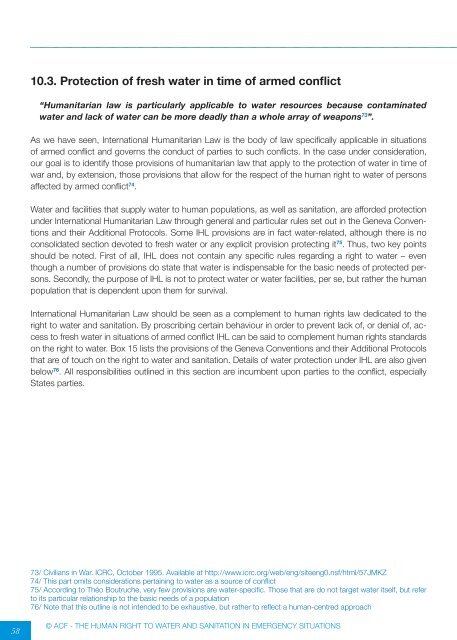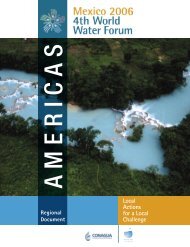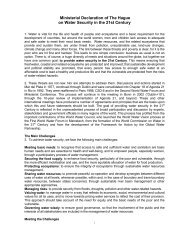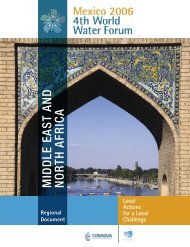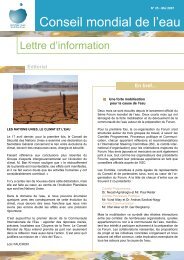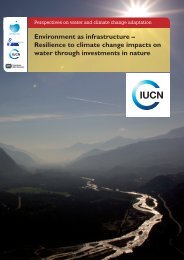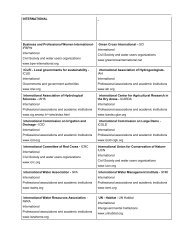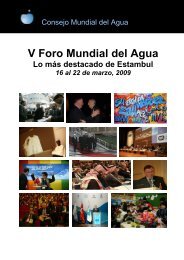the human right to water and sanitation in emergency situations
the human right to water and sanitation in emergency situations
the human right to water and sanitation in emergency situations
You also want an ePaper? Increase the reach of your titles
YUMPU automatically turns print PDFs into web optimized ePapers that Google loves.
58<br />
10.3. Protection of fresh <strong>water</strong> <strong>in</strong> time of armed conflict<br />
“Humanitarian law is particularly applicable <strong>to</strong> <strong>water</strong> resources because contam<strong>in</strong>ated<br />
<strong>water</strong> <strong>and</strong> lack of <strong>water</strong> can be more deadly than a whole array of weapons 73 ”.<br />
As we have seen, International Humanitarian Law is <strong>the</strong> body of law specifically applicable <strong>in</strong> <strong>situations</strong><br />
of armed conflict <strong>and</strong> governs <strong>the</strong> conduct of parties <strong>to</strong> such conflicts. In <strong>the</strong> case under consideration,<br />
our goal is <strong>to</strong> identify those provisions of <strong>human</strong>itarian law that apply <strong>to</strong> <strong>the</strong> protection of <strong>water</strong> <strong>in</strong> time of<br />
war <strong>and</strong>, by extension, those provisions that allow for <strong>the</strong> respect of <strong>the</strong> <strong>human</strong> <strong>right</strong> <strong>to</strong> <strong>water</strong> of persons<br />
affected by armed conflict 74 .<br />
Water <strong>and</strong> facilities that supply <strong>water</strong> <strong>to</strong> <strong>human</strong> populations, as well as <strong>sanitation</strong>, are afforded protection<br />
under International Humanitarian Law through general <strong>and</strong> particular rules set out <strong>in</strong> <strong>the</strong> Geneva Conventions<br />
<strong>and</strong> <strong>the</strong>ir Additional Pro<strong>to</strong>cols. Some IHL provisions are <strong>in</strong> fact <strong>water</strong>-related, although <strong>the</strong>re is no<br />
consolidated section devoted <strong>to</strong> fresh <strong>water</strong> or any explicit provision protect<strong>in</strong>g it 75 . Thus, two key po<strong>in</strong>ts<br />
should be noted. First of all, IHL does not conta<strong>in</strong> any specific rules regard<strong>in</strong>g a <strong>right</strong> <strong>to</strong> <strong>water</strong> – even<br />
though a number of provisions do state that <strong>water</strong> is <strong>in</strong>dispensable for <strong>the</strong> basic needs of protected persons.<br />
Secondly, <strong>the</strong> purpose of IHL is not <strong>to</strong> protect <strong>water</strong> or <strong>water</strong> facilities, per se, but ra<strong>the</strong>r <strong>the</strong> <strong>human</strong><br />
population that is dependent upon <strong>the</strong>m for survival.<br />
International Humanitarian Law should be seen as a complement <strong>to</strong> <strong>human</strong> <strong>right</strong>s law dedicated <strong>to</strong> <strong>the</strong><br />
<strong>right</strong> <strong>to</strong> <strong>water</strong> <strong>and</strong> <strong>sanitation</strong>. By proscrib<strong>in</strong>g certa<strong>in</strong> behaviour <strong>in</strong> order <strong>to</strong> prevent lack of, or denial of, access<br />
<strong>to</strong> fresh <strong>water</strong> <strong>in</strong> <strong>situations</strong> of armed conflict IHL can be said <strong>to</strong> complement <strong>human</strong> <strong>right</strong>s st<strong>and</strong>ards<br />
on <strong>the</strong> <strong>right</strong> <strong>to</strong> <strong>water</strong>. Box 15 lists <strong>the</strong> provisions of <strong>the</strong> Geneva Conventions <strong>and</strong> <strong>the</strong>ir Additional Pro<strong>to</strong>cols<br />
that are of <strong>to</strong>uch on <strong>the</strong> <strong>right</strong> <strong>to</strong> <strong>water</strong> <strong>and</strong> <strong>sanitation</strong>. Details of <strong>water</strong> protection under IHL are also given<br />
below 76 . All responsibilities outl<strong>in</strong>ed <strong>in</strong> this section are <strong>in</strong>cumbent upon parties <strong>to</strong> <strong>the</strong> conflict, especially<br />
States parties.<br />
73/ Civilians <strong>in</strong> War. ICRC, Oc<strong>to</strong>ber 1995. Available at http://www.icrc.org/web/eng/siteeng0.nsf/html/57JMKZ<br />
74/ This part omits considerations perta<strong>in</strong><strong>in</strong>g <strong>to</strong> <strong>water</strong> as a source of conflict<br />
75/ Accord<strong>in</strong>g <strong>to</strong> Théo Boutruche, very few provisions are <strong>water</strong>-specific. Those that are do not target <strong>water</strong> itself, but refer<br />
<strong>to</strong> its particular relationship <strong>to</strong> <strong>the</strong> basic needs of a population<br />
76/ Note that this outl<strong>in</strong>e is not <strong>in</strong>tended <strong>to</strong> be exhaustive, but ra<strong>the</strong>r <strong>to</strong> reflect a <strong>human</strong>-centred approach<br />
© ACF - THE HUMAN RIGHT TO WATER AND SANITATION IN EMERGENCY SITUATIONS


